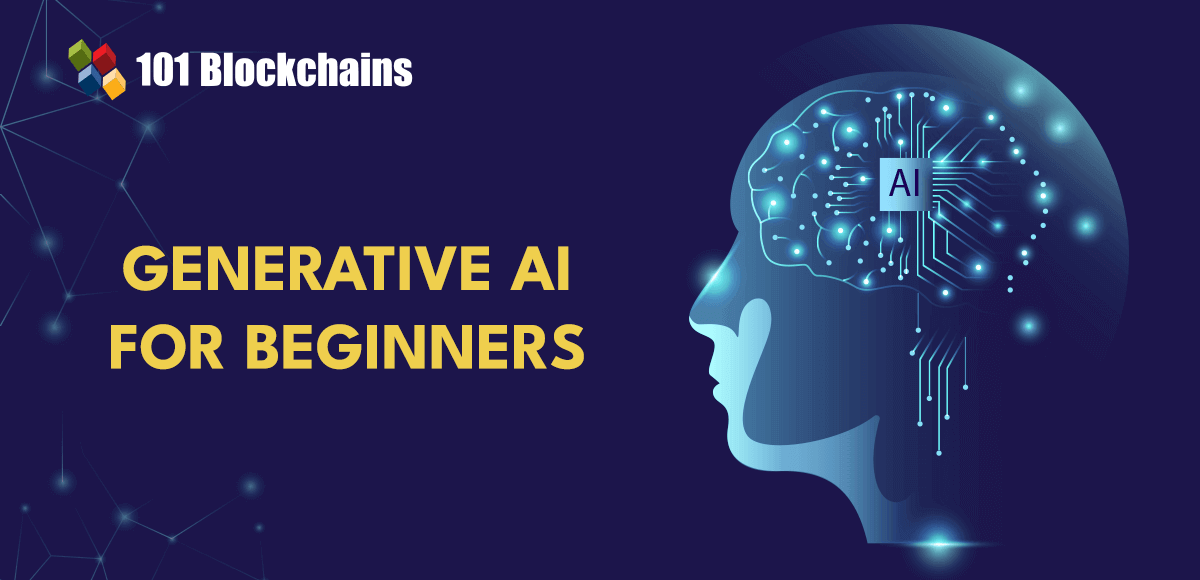How do you get started with generative AI training?

The world is at a crossroads in history as technology in the form of AI advances significantly. Artificial intelligence has become one of the essential tools for driving productive innovation across a variety of industries. Generative AI is one of the most valuable forms of AI that has encouraged mainstream adoption of artificial intelligence points. The best example of a generative AI tool can be seen in ChatGPT.
More people want to learn about generative AI and its potential to transform existing systems and processes in their business. According to Forbes Advisor, nearly 97% of business owners believe ChatGPT will bring positive changes to their business operations. Generative AI tools such as ChatGPT, Google Gemini, Midjourney, and DALL-E 3 are bringing AI into the mainstream market.
Artificial Intelligence is a branch of computer science that focuses on creating systems with the ability to simulate human intelligence. Generative AI is one notable variant of artificial intelligence that focuses on generating output in response to user input or prompts. If you’re interested in learning AI, start with generative AI and its examples.
You should also look for important resources that can help you become a generative AI expert. Let’s explore the benefits of learning generative AI and best practices for specializing in generative AI. You’ll also find ideal resources for building fluency in generative AI.
Unleash the full potential of generative AI in your business use cases and identify new ways to become an expert in generative AI technologies with the Generative AI Technology Path.
The Importance of Generative AI
Generative AI has been receiving considerable attention recently, especially among AI enthusiasts. Discussions about choosing the ideal generative AI learning path draw attention to the importance of generative AI. Currently, the market capitalization of the global generative AI market is $13.71 billion. That number could rise to more than $22 billion by 2025. Experts also pointed out that the generative AI market could surpass $110 billion in market capitalization by 2030.
In addition to market growth, the use of generative AI by people of different generations shows its growing popularity. Salesforce reports that approximately 27% of Millennials, 29% of Gen Z, and 28% of Gen X are actively using generative AI tools in their workplace environments. The interest in finding generative AI resources is not limited to adoption. Users feel more confident in understanding the complexities of generative AI. In fact, about 60% of users are confident in their ability to become generative AI experts.
The next important highlight in the discussion of the importance of generative AI is attention to the reasons for adopting generative AI. Nearly 75% of users leverage generative AI to automate tasks to increase productivity and streamline processes.
Additionally, approximately 52% of Gen Z users trust generative AI as a useful tool for making important decisions. Generative AI is therefore increasingly becoming an essential part of decision-making.

Why should you learn generative AI?
The growing use and adoption of generative AI provides good reason to learn about it. With the help of effective generative AI learning paths, you can expand your skill set and use it for professional development. Moreover, learning generative AI from scratch offers other reasons besides learning a new skill.
Skills and knowledge of generative AI can help you make informed decisions for organizational implementation or career development. Here are some benefits of learning generative AI from scratch:
Learning generative AI from scratch will help you build foundational mathematical skills with a deeper understanding of algorithms. This helps develop a comprehensive understanding of the operation and performance of the algorithm. Your mathematical skills will be useful in learning complex algorithms such as probabilistic models, GANs, and autoencoders, which are critical elements in developing generative AI models.
Learners’ curiosity about how to start learning artificial intelligence leads to the basics of programming. Becoming proficient in a programming language allows learners to better understand best practices for implementing various algorithms. It can provide valuable insight into the capabilities of generative AI models, ensuring efficiency and optimization of model development.
Another important reason to learn generative AI from scratch is to develop agility to stay up to date on new trends. Learners can develop readiness to adapt to new developments in the area of generative AI. This can help learners stay ahead and relevant in the ever-evolving field of technology.
Enroll in the ChatGPT Fundamentals course today and dive into the world of immediate engineering with real-world demonstrations.
A step-by-step process for learning generative AI from scratch
The journey to develop expertise in generative AI follows an iterative and systematic path. There are several steps to follow that are interrelated and help you develop a deep overall understanding of generative AI and hands-on expertise. Here are the essential steps you need to follow to become proficient in generative AI:
-
Develop essential prerequisite skills
The recommended first steps in the generative AI learning path focus on developing critical prerequisite skills. The essential skills needed to learn generative AI include basic math, basic statistics, and a commitment to learning. AI relies on mathematical concepts, especially in the areas of deep learning and machine learning.
A basic understanding of the concepts of linear algebra, probability, and calculus is required. Additionally, learners should prioritize statistics because it helps them effectively interpret data and extract insights. Some of the important statistical concepts required in the area of generative AI include distribution, regression, and statistical significance.
-
Master the basics of machine learning
The next step on your journey to develop expertise in generative AI is learning machine learning fundamentals. To gain a deeper understanding of how generative AI works, you need to be deeply fluent in the fundamentals of machine learning. Anyone looking to learn artificial intelligence should start with the basic concepts of ML and the techniques used to develop ML algorithms.
Learners must become familiar with techniques such as supervised and unsupervised learning, along with the complexities of regression and classification models. It is also important to learn the nuances of testing and training datasets for machine learning. You can use our online course on machine learning with interactive projects to enhance your expertise in machine learning fundamentals.
Do you want to understand the importance of ethics in AI, ethical frameworks, principles and challenges? Enroll in our Artificial Intelligence (AI) Ethics course now
-
Improve your Python programming skills
Another important requirement for anyone looking to develop generative AI technologies is the Python programming language. Python is an essential prerequisite for learning AI because it is one of the most popular languages in the AI and machine learning environment. Fluency in Python programming is an essential requirement for implementing machine learning models, along with learning more about generative AI. Therefore, you will need to develop an in-depth understanding of Python syntax, libraries, and data structures.
Learners should pay special attention to Python libraries such as TensorFlow, NumPy, and Pandas and their use in machine learning. Experts suggest using project-based learning and an interactive coding platform to develop practical fluency in Python for generative AI.
-
Learn about data science and deep learning
The next important step in learning generative AI is developing expertise in data science and deep learning. Learners should find generative AI course materials to help them become familiar with data preprocessing, visualization techniques, and feature engineering. These skills are a critical requirement for effectively understanding and managing complex data sets.
You should also explore the concepts of neural networks, recurrent neural networks, and convolutional neural networks, along with other deep learning architectures. You will also need to develop a better understanding of applications in natural language processing, sequential data analysis, and image generation.
Do you want to learn the basics of AI applications in business? Enroll in the AI For Business course today
-
Start with the basics of generative AI
Armed with all the basic skills, you are now ready to take the first steps towards learning generative AI. You can learn the basic concepts and various application methods of generative AI, including style transfer, image creation, and text-image conversion. Learners must also invest effort in learning the important principles underlying the operation of generative adversarial networks (GANs) and variational autoencoders (VAEs). You should also learn about other popular generative AI models and their capabilities. The best way to strengthen your foundational understanding of generative AI is through research papers, special courses, and online courses.
-
Try our exercises and assignments.
Learning generative AI theory will only be of some help in pursuing a career in generative AI. You need to focus on how to start learning artificial intelligence through practice. The most notable advantage of practicum is that it allows you to develop practical expertise.
We need to develop generative AI models for art creation, music production, and image compositing. It is also important to work with existing data sets and optimize generative AI models to explore the complexity of their behavior and limitations. You can leverage platforms like GitHub and Kaggle, along with other open source repositories, to access dataset collections and project ideas to implement and showcase your technologies.
Develop expert-level skills in rapid engineering and become a master of generative AI applications with the Prompt Engineer Career Path.
Where can I find resources to learn generative AI?
For beginners interested in learning generative AI, the most important question is finding the ideal training resource. You can use generative AI resources from trusted platforms, such as learning paths from Google or courses from platforms like LinkedIn Learning.
Explore Google’s Learning Path for Generative AI to learn about the fundamentals of Generative AI, LLM, and Responsible AI. You can then dive deeper into generative AI development topics such as attention mechanisms, transducer models, encoder-decoder architectures, and image caption model development.
final words
Reviewing the critical steps to learning generative AI reveals that anyone can start learning generative AI from scratch. Most importantly, you don’t need to be an AI expert to improve your fluency in generative AI. As the world embraces various forms of generative AI, it is important to consider the benefits of generative AI learning.
Interestingly, you can find many platforms that offer reliable and comprehensive training resources on generative AI. Learners should enhance their understanding of generative AI fundamentals and develop practical skills in generative AI through guidance from expert instructors. Find the best course on the basics of generative AI today.




